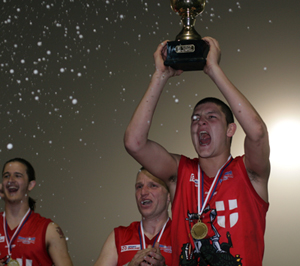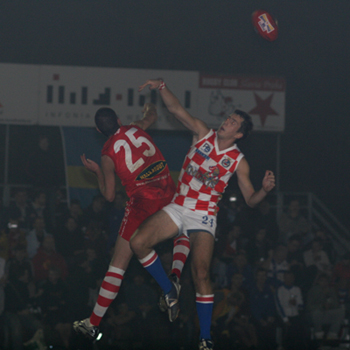England take EU Cup - tournament review
- Saturday, October 18 2008 @ 11:54 am ACDT
- Contributed by: Aaron Richard
- Views: 14,740

 Last weekend saw the England Dragonslayers win their first EU Cup, defeating very strong debutants Croatia in a dominant display of 9-a-side footy. The tournament was viewed by a crowd of around 500 and was streamed live via the internet, receiving around 21,000 views over the course of the day.
Last weekend saw the England Dragonslayers win their first EU Cup, defeating very strong debutants Croatia in a dominant display of 9-a-side footy. The tournament was viewed by a crowd of around 500 and was streamed live via the internet, receiving around 21,000 views over the course of the day.
The Sunday following the tournament saw a conference held where team managers were able to put forward their views and plans for the future of footy in Europe, including some discussion of a future European Championship, played 18-a-side with no expats - a topic we'll be covering in more detail in the near future.
A collection of photos from the event can be viewed here.
Following report courtesy of Kirsten Puls.
Saturday the 11th of October saw 12 teams compete for the EU Cup at the Slavia Sports Centre in Prague. This 9-a-side competition, now in its third edition in four years, is played in shortened matches of two 12 minute halves. Footy enthusiasts from all over Europe gathered to participate - from Finland to Catalonia and from Scotland to Croatia. The tournament was watched not only by a live crowd of around 500 people but by an online audience of 21,000 over the two fields - a first for the sport in Europe and a clear signal of the interest it generates.
The 11 competing nations varied widely in makeup. Not just in nationality, but in their sports backgrounds (rugby, soccer, ice-hockey), the experience of players (from those with years of experience to first gamers, like 2.06m tall Dutchman Frank Smit. And of course, when one of the teams is Holland, now the tallest nation on earth, one must also consider height a factor). The number and calibre of Australian expatriates in the team is known to have a large influence on games. As a counterweight, teams were rewarded with points on the board per non-Australian native fielded: three points for a local national, two for senior Australians (born before 1970) or non-Australian non-locals (third country).
Match preparation also varied widely – from nothing (“we’re having a break,” said German captain and AFLG President Malte Schudlich) to the intensive four-timesper- week training schedules and tactical brainstorming sessions of Croatia. Put all this together, and the scene was set for a tournament full of surprises – a football season in microcosm. Hot favourites were last year’s winners Sweden, runners-up Germany and England. However, Swedish and Finnish teams were severely weakened by absences, and the Catalans were missing four star players out through injury. From his own experience of them, Tournament Director Ashley Ball tipped first-time entry Croatia as a dark horse.
The morning’s matches sorted the sheep from the goats within the four pools of three teams. As the day wore on the play matured from downright scrappy to polished. By midday, the more experienced teams were stringing together beautiful sequences of play. The German Eagles finished top of group A, but it wasn’t all plain sailing. Although the Eagles had much of the slippery dew-covered ball in their first match against Holland, they struggled to finish. The Flying Dutchmen showed fight and were physical despite some hesitant play from the first gamers. Things finally began to fall into place for Germany just before half time with a goal from Tim Horenburg and fluid passage of play from ruck Michael Schuardt to Mattias Oser, ending in a goal. The Eagles won game 89 to 51.
The Croatian Knights topped pool C and came out pumped with enthusiasm despite their 12 hour drive to Prague the day before. All the training bore fruit as they dealt Austria a walloping, winning 103 to 26. Strong marks and a willingness to get to the ground after the ball (not so obvious to soccer players) marked Croatian play all day.
The England Dragonslayers, winners of pool B, began by facing a Scottish Puffins team hastily cobbled together from a league in disarray. England was a little scrappy early, letting Scotland get closer than might have been expected, but clearly wanted the ball more. This intense focus on the task at hand set them apart during the tournament. They had even developed a rugby-inspired lineout code system for centre bounces to confuse the opposition. Gradually warming up, players began to shine: Will Worthington slaloming through the opposition towards goal was a valuable contributor to England’s 88 to 42 victory.
Topping Pool D, the Swedish Elks had an untroubled morning against the EU Crusaders and the depleted Catalans. Mark McManus provided focus and drive for the Swedes with superb marks and accurate kicking and was eventually named the tournament’s most valuable player.
The half time activities (besides sausage-eating) were contests for Europe’s Longest Man (the longest kick, taken out also by Mark McManus, Sweden with a 55m barrel), the Strongest Man for the most number of push-ups (congratulations to Catalan Semy Gallego) and Fastest Man over 100m, won by Germany’s Gero Rosenthal.
It was an afternoon of warm sun and even warmer finals. The Swedes certainly got heated in their encounter with England in the 1st semi-final. The contrast between the morning’s and afternoon’s opposition came as a rude shock to the Elks, who were outclassed, clearly rattled and upset with the umpiring. Visiting retiree Victorian country umpire Ron Rickett suggested that the Swedes may have deserved some of what they got for playing the man rather than the ball. 18.8.118 to 7.7.49 was the final scoreline.
France’s co-manager and founder of footy in France Marc Jund said he felt the team’s standard was “very low” but hoped to go one place better than last year. They tussled tightly with the Finland Icebreakers for the 5th place plate. Ferocious French tackling from the likes of Alexis Schimpf and Joevin L’Hotellier, a blessing from rugby experience, combined with the drive provided by skilful midfielder Jerome Krieger challenged the Finns. Unfortunately the French game stagnated on the forward line. The Finns, with experience in their forward line in the form of international footy stalwart Julian “Rooster” Clark had no such problem and took the match 7.12.54 to 8.4.52, the French score aided by their penalty advantage. The French were nonetheless quietly pleased to have done as well as they hoped.
The Czech Lions were televised in the 11 versus 12th place playoff match, and rose to the occasion to fend off the weary Austrians 11.5.71 to 5.2.32.
A Scottish team further depleted by injury forfeited 7th place to the Catalans while the Dutch squeaked past the EU crusaders, composed of spares and Poles getting their first taste of footy, for 9th place (11.2.68 to 9.8.62).
The Second semi-final was the clearly the match of the day. The all-German and all-Croat
line-ups fought hard and passionately. The Germans led at half time, 7 and 15 making
valuable contributions but the Croats always looked dangerous and took control in the
second half. Strong body work from the founder of Croatian footy Kolja Koracak,
Kreso Franic and Renato Babic and a near impervious half back line started to take
their toll. Sniffing defeat, the Eagles began to make mistakes, going down fighting 10.10.70
to 12.2.74. The Germans made no mistake against the demoralised Swedish Elks in the
playoff for 3rd place, however. A running goal from Tim Horenburg sealed it for the
Germans, winners 15.8.98 to 8.7.55.

The Cup Final between England and Croatia was ushered in by national anthems. During the singing, fog began to descend and would render play slippery and uncertain. Lights were on and the crowd boisterous, attempting mini Mexican waves. The Croatian Knights were already on such a high from their surprise win over the Eagles that Kolja Koracak worried about whether they could focus on the final match. Indeed, England assumed command from the word go with a long-bomb goal. The stream of English play from centre to goal was effortlessly fluid and the demolition of Croatia for the most part smooth despite the fog.
Against earlier opponents, the Croats had been able to leverage sharper skills, superior fitness and greater enthusiasm. Now they were up against another level of opposition: the English proved just as fit, taller and combined skill and experience with a will to win that was just as strong and more coldly focussed. There were strong performances all over the field, notably from Mathew Bradford, team playing coach Rob Fielder and the tall Lee Tarn, with a few bright spots for Croatia, notably a goal from captain-coach and tactics guru Josep Kravar. Final scores told the story, England winning 16.11.107 to 9.5.59.
At the Cup dinner at the Iris Congress Hotel, player awards were presented and team Europe named. There were no hard feelings and plenty of singing and dancing, carried on ‘til dawn. The Tournament was deemed to have been a great success, the result of the hard work of the organising committee Ashley Ball (Czech Republic), Brian Clarke (UK) and Philip Porublev (Sweden).
Full scores are available from the Footy Record.


 RSS news
RSS news Twitter
Twitter Facebook
Facebook